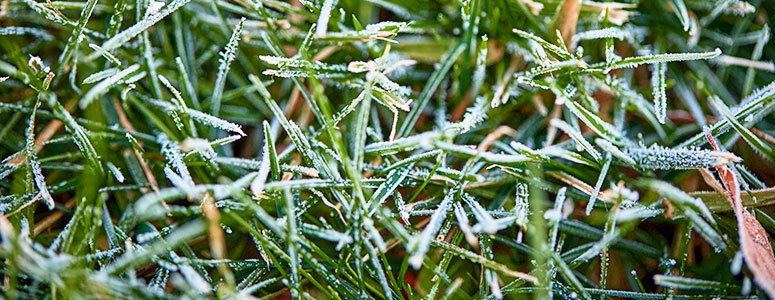Winter
As winter approaches, keep your lawn clear of leaves, pine needles, cones, gum balls, acorns, and sticks. Also, replenish ornamental bed mulch after leaf removal.
What Happens to Your Lawn in the Winter?
In Virginia's climate, grasses go dormant in the winter. Shorter days and colder temperatures typically slow down grass growth and turn the lawn a tan/brown color. This will occur with all grass types including Tall Fescue and Bluegrass.
In cold, windy areas, grass blades can also go dormant from a process call Desiccation. The cold dry winds and freezing soil temperatures cause the blades and roots of fescue to lose their moisture, and the roots to freeze, hence no water can replace the lost moisture. This causes a green vibrant lawn to turn brown, and tan in color. This is most noticeable on west-facing areas that have no protection from the wind.
Though the grass looks dead, it is still alive! Once air and the soil temperatures rise in late March to early April, the turf color will begin to change and start to grow again.

Need Help With Seasonal Lawn Care?
Learn more about our lawn care services that will help you get ready for any season.
Winter Tips
Ways to Minimize Injury During Winter Months
- Apply late fall fertilizer, which acts as a natural anti-freeze for better cold tolerance, maintains lawn density, and stimulates spring color and growth.
- Continue to mow your lawn in the fall until it stops growing. Never reduce mowing to less than 3”.
- Remove leaves as often as possible, at least once per week. Leaves block light and oxygen from reaching the leaf blade of the plant, and they also trap moisture, which can lead to rot and disease.
- Use a leaf blower instead of a rake to remove fallen leaves.
- Continue to water until Thanksgiving.
- Stay off the lawn if it is frozen. Walking on the grass can kill those spots, because the crown of the plant is more sensitive to being crushed when frozen
Lawn dormancy is normal, and we should expect our lawns to be off-color in the winter. By properly preparing our lawns now, we can expect outstanding color and growth in the spring.
Winterize Your Irrigation System
With dropping temperatures, you must have your irrigation system winterized and shut down by scheduling a visit from a contractor. Winterizing your sprinkler system is essential before freezing temperatures occur. There are different ways of winterizing, so make sure you confirm what suits your system best with your irrigation company.
In addition, you should drain outdoor hoses and bring them into a garage, or another warmer area, so they don’t freeze and crack. It’s also a good idea to shut down water to outside faucets to avoid freezing pipes and any damage that may occur.
